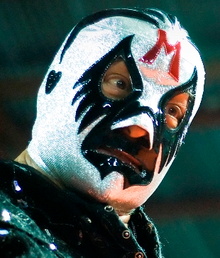Mil Máscaras
| Mil Máscaras | |
|---|---|

Máscaras in 2009.
|
|
| Birth name | Aaron Rodríguez Arellano |
| Born |
July 15, 1942 San Luis Potosí, San Luis Potosí, Mexico |
| Family |
Dos Caras (brother) Sicodélico (brother) Alberto El Patron (nephew) El Hijo de Dos Caras (nephew) Sicodelico Jr. (nephew) Hijo de Sicodelico (nephew) |
| Professional wrestling career | |
| Ring name(s) | Mil Máscaras |
| Billed height | 1.80 m (5 ft 11 in) |
| Billed weight | 111 kg (245 lb) |
| Trained by |
Diablo Velasco José Hérmes |
| Debut | July 16, 1965 |
Mil Máscaras (born Aaron Rodríguez Arellano, July 15, 1942) is a Mexican luchadore.
Máscaras is one of the original "Big Three" of the lucha libre tradition in Mexico (the other two being El Santo and Blue Demon). He is considered one of the most influential wrestlers of all time for enhancing and popularizing the lucha libre style around the world both in the ring and as the star of 20 films. He is also an accomplished artist and cultural ambassador from his native country and has appeared on three of its postage stamps. He is a member of one of Mexico's most prominent wrestling families—his brothers José and Pablo respectively wrestle as Dos Caras and Sicodélico, José's older son Alberto wrestles as Alberto El Patron, José's younger son Guillermo wrestles as El Hijo de Dos Caras (an identity that Alberto had once used), and Pablo's son Aaron is better known as Sicodelico, Jr.. Máscaras was inducted into the Professional Wrestling Hall of Fame in 2010, and the WWE Hall of Fame in 2012. His ring name is Spanish for "Thousand Masks".
Mil Máscaras made his professional wrestling debut in April 1965 in Guadalajara. Máscaras became popular in Mexico for being one of the best conditioned luchadores in the heavyweight division, which was dominated by foreigners at the time. It was also his size which permitted him to wrestle in the US and Japan under the heavyweight division. Máscaras was one of the first masked luchadores outside of Mexico to play a non-heel role. He rarely resorted to rule breaking, instead relying on his repertoire of moves and counter-moves. Máscaras was also one of the first wrestlers to introduce the high-flying moves of lucha libre, such as the plancha and tope suicida, to Japanese fans. This brought him international fame as one of the first high-flyers, something he was not considered in Mexico where he fell under the mat-power category.
...
Wikipedia
